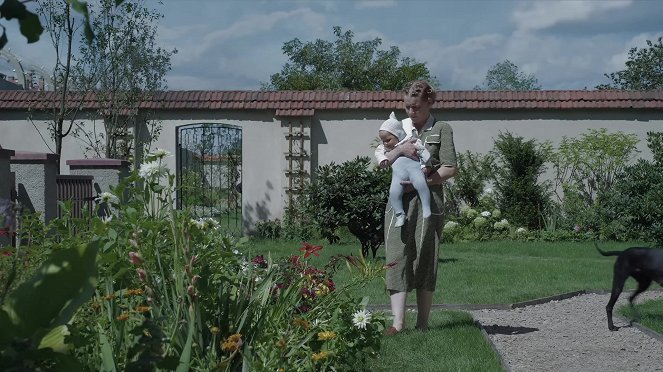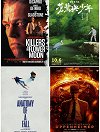Rendező:
Jonathan GlazerForgatókönyvíró:
Jonathan GlazerOperatőr:
Łukasz ŻalZeneszerző:
Mica LeviSzereplők:
Sandra Hüller, Christian Friedel, Ralph Herforth, Freya Kreutzkam, Max Beck, Ralf Zillmann, Imogen Kogge, Stephanie Petrowitz, Marie Rosa Tietjen (több)Tartalmak(1)
Auschwitz parancsnoka, Rudolf Höss (Christian Friedel) és felesége, Hedwig (Sandra Hüller) egy haláltábor melletti házban igyekeznek áloméletet teremteni a családjuknak. (ADS Service)
Recenziók (10)
Jonathan Glazer ismét erősen szerzői és művészi. A filmben nem látunk egyetlen auschwitzi foglyot sem, sem a tábor falai mögött elkövetett borzalmakat. Minimalista módon megrendezett, de hatásosan előadott események Hössék villájában és kertjükben játszódnak, amelyet az a fal veszi körül, amely felett látszik a koncentrációs tábor barakjainak teteje. Höss illedelmesen jár "dolgozni", szabadidejét pedig családjával tölti. Höss felesége a kert virágaiban gyönyörködik. Gyermekeik a medencénél játszanak. Höss időnként munkalátogatást kap, jön például mérnök, a hatékonyabb égetőmű terveivel. Néha valaki hoz nekik egy zsák szép ruhát, hogy válogassanak belőle... Egész idő alatt távolból halljuk a halálgyár gépezetének dübörgését, néha emberek sikoltozását, kutyaugatást, puskalövéseket. Az égen fekete hamufelhők szállnak. Höss gyerekeinek érzékelése a házon kívüli világról apró árnyalatokban is félreérthetetlen. A kislány éjszakai álmai fekete-fehér inverziós képekben a leghatásosabb művészi díszlet, amellyel a film tele van, a fesztivál nézőjének maximális megelégedésére. Zseniális az a jelenet, amelyben Höss egy lépcsőházban áll, sötét, üres folyosókkal. Számomra ez a film csúcspontja. A holokauszt más szemszögből nézve, zárófeliratoknál a legkellemetlenebb zenével, amit valaha is tapasztaltál. Jonathan Glazer ezzel olyan mesterek társaságába kerül, mint Michael Haneke és Yorgos Lanthimos.
()
Such is the daily routine of a family of ordinary, decent citizens. They grow kohlrabi and carnations in the garden, keep the house in perfect order, pet the dog and frolic in the swimming pool, and all this is provided by the head of the family, who goes to work every day in an exemplary manner and who - by the way - is the director of the most monstrous concentration camp. He is, again by the way, at work dealing with, for example, the more efficient incineration of Jews in ovens, and does it with the same emotional involvement as when you and your wife are deciding what to buy for dinner at the supermarket. And behind the walls of this middle-class family's property, behind those ominous walls, is a human-scale Mordor where the most monstrous acts against humanity are taking place, and you feel an immense oppression thanks to the ingenious sound work and the ominous visual details in the distance, such as the smoke from the ovens, or from the locomotives bringing in more and more human fuel. The film doesn't shove down your throat horrific imagery about how monstrous the Holocaust is, it does it on a subliminal basis, working with your subconscious, and that actually makes it all the worse. It made me sick, but at the same time I bow down to Jonathan Glazer for this bold cinematic experiment that says more about us humans than you'd expect.
()
Though throughout most of the film we don’t see anything other than an outwardly ordinary German family, the layered soundtrack, which mixes the chirping of birds and the murmur of a river with a constant mechanical drone, evokes an almost indefinable feeling from the first minutes, a feeling that something intimately familiar seems strange and oppressive. The resulting effect is best described by the term “unheimlich” from Freud’s psychoanalysis, i.e. uncanny. Zone of Interest is extremely disturbing in its ability to capture the abnormality of the everyday. ___ The unchanging, rigid apathy of the depicted world is underscored by predominantly static shots without artificial lighting and with great depth of field. The cameras are positioned in different corners of the house and garden like in a reality TV show. They record the movements of the actors without artistic stylisation, thus evoking an impression of the distant past. Not even the editing adheres to the principles of standard narrative cinema. The switching between cameras depends on which room a character has just entered. Everything thus seemingly takes place in the present tense. Subjectivity and creativity, or rather the possibility of averting one’s gaze and disrupting the order of things, are suppressed. The tasks that Höss carries out are mindless administrative work. Genocide is a logistical process. ___ If we wanted to locate the source of the tension that pervades the whole film, it would be the clash between what the Hösses are willing to see and what happens outside of their house and garden. Glazer’s distinct style is a form of rejection. He consistently avoids aestheticizing one of the greatest tragedies of modern history. At the same time, he succeeds in using empty space in a way that is far more powerful than direct depiction. Because we cannot see the other side, we are aware of what is happening there. Our effort to fill this gap leads to the fact that we cannot stop thinking about the ongoing violence. ___ Glazer also included night scenes shot with a special thermal camera. This involves a reconstruction of the story of a ninety-year-old Polish woman named Alexandra, whom Glazer met during his research. She became for him a symbol of resistance, a light in the darkness. Taking into account the perspective of those who actively resisted Nazism is one of the few elements that Zone of Interest shares with more conventional dramas about the Holocaust. Where other Oscar-winning dramas offer catharsis and a reassurance that humanity will ultimately prevail, Zone of Interest offers only a disturbing presentiment of things to come. We see that the concentration camp has become a museum where cleaners mechanically vacuum the dust and polish the display cases. A single glance inside the death factory peculiarly does not reveal any atrocities. Rather, it is characterised by the same emotionless routine that we saw in the Hösses’ bourgeois household. We have become accustomed to the presence of the Holocaust in our collective memory and in the media space. Zone of Interest shines a light on the mundanity, banality and elusiveness of the evil to which we contribute merely by remaining indifferent. 90%
()
(kevesebbet)
(több)
I have a bit of a complicated relationship with director Jonathan Glazer. I like some of his films a lot, others practically not at all, and I'm glad Zone of Interest falls into the former group. I'm also happy that it ended up looking a little different than I expected. Glazer's Holocaust drama is very much built on working with sounds, but mostly with the viewers and their knowledge. You have to know what family you're looking at all the time, who Rudolf Höss was and what atrocities he committed. Zone of Interest doesn't explain anything, you could say that we learn practically nothing about the protagonists, because there's no need to, and Glazer is counting on you paying attention in history class, or at least reading the synopsis before entering the cinema. This allows him to focus solely on establishing atmosphere, combining hints of the horrors happening behind the walls of the family home while showing the ordinary little Nazi domestic bliss of the Hösses and their children. They come across as extremely ordinary, and that they are cynics and human monsters is something you have to surmise from their actions, as they balefully ignore the hell they themselves have unleashed or are willingly profiting from. Perhaps my only complaint is that I would have expected Zone of Interest to make it a little harder (like, say, the new Scorsese) and more uncomfortable for me as a viewer. On the other hand, Glazer's attempt to merely chronicle the family life of two monsters who tend a greenhouse, organize family get-togethers in the garden, and invite a loving mother to their home, only to occasionally subtly remind us who we're actually dealing with, works well too. An original and compelling drama capable of being very uncomfortable at the right moments.
()
Scenes from National Socialist married life and a film whose concept is drawn so tight that it left me feeling oddly indifferent. The idea of transforming a death factory into a 2D backdrop, which Łukasz Żal’s camera literally pushes through the depth of field to the Hösses’ “garden of paradise” is suffocating and oppressive, but it also leads to a certain monotony and risks making the viewer get used to it just as the characters get used to the ubiquitous stench, screaming and moaning. The central couple cannot be humanised to a sufficient extent to form a psychological counterpoint to the horrors of the Holocaust, so I found that there was something mechanical in the Hösses’ routines that made it easier for me to disconnect from the urgency of Glazer’s world. The banality of evil is precisely and literally illustrated. I was reminded of Markus Schleinzer’s similarly conceived and distanced film Michael, which, however, started to be truly impressive at the moment when the character of the blasé paedophile rapist gets an adversary in the form of the victim in a powerful reverse shot. Glazer chooses a similar principle at the end, but in doing so, he breaks the fourth wall in a way that has more intellectual calculation than natural power. Was Höss aware of the moral implications of his actions or was he able to conceal them in the rhetoric of industrial production and historical necessity? This is where the possibilities of Glazer’s film reach their limit. In the ever-powerful deluge of “Holocaust porn”, The Zone of Interest is important for its differentness and its courage to change the perspective, to expose the viewer to the “cognitive dissonance” experienced by the direct perpetrators of evil. It is also an interesting reflection on the central ideological concept of Lebensraum, which in the portrayal of Frau Höss takes the form of a neat garden fertilised with the ashes of the dead. Nevertheless, I enjoy reflecting on the film from a distance significantly more than experiencing it directly on the screen. In that respect, I give preference to the concept of Son of Saul…and to reading the immensely monstrous The Kindly Ones, which went much deeper into the psyches of the architects of the Holocaust than The Zone of Interest.
()
Zone of disinterest. One of those films that the teacher puts on in history class, but 80% of the students would rather pull out their cell phones and scroll through Instagram because it's almost as boring as regular class. The film is completely empty in terms of information, so it doesn't even serve an educational purpose. We follow the banalities of the daily life of a concentration camp commander and his family. We learn nothing about the characters, the dialogues are cut down to the minimum, Auschwitz is not shown, so again a film for book readers, where the viewer has to figure everything out (fck you!!), it has no script, the atmosphere doesn't work at all, there’s no build-up, no tension or escalated drama between the Nazis, the emotions below zero, and in the end, instead of showing a pile of corpses, they show only shoes. The film is so empty, slow and boring that even if you skips twenty minutes, you won’t miss anything crucial. Son of Saul was thematically similar, but somewhere else. An intimate arthouse of the highest order. 3/10.
()
A formally interesting experiment (being created concurrently with the book of the same name by Martin Amis), drawing attention to a topic that we should have already processed. Many fundamental questions concerning the primary human attitude, such as "How could the main commander of the Auschwitz concentration camp, Rudolf Höss, calmly sleep, go home every day, and peacefully have dinner with his family...?" should not be posed for the first time by a co-produced film. Similarly, the everyday life of Höss's wife, Hedwig, should not surprise or fascinate us for the first time. On the contrary, we should have a rich knowledge of the reality of the war and be able to work with it. Many prominent women from this time have written memoirs, which in many ways only repeat, complement, and explain to us what and why happened in their lives. They serve excellently as memories, especially the memoirs of secretaries Traudl Junge, Brunhilde Pomsel, and Louise Fox. The question of obedience to authorities and blind fulfillment of orders was thoroughly analyzed by Hannah Arendt in her series of reports "Eichmann in Jerusalem: A Report on the Banality of Evil". Furthermore, we should be immune to demonizing the German language itself and always remember that the Third Reich existed for only 12 years and is primarily the language of Goethe, Schiller, and Rilke. It is absurd to what extent the current public is not interested in the new film Terezín, but the Oscar-nominated The Zone of Interest naturally appeals to moral values and interest in the matter. However, if this trendy film brings some understanding even to those viewers who only watch new titles, this concession can be accepted.
()
The Zone of Interest depicts the concentration camps and the Holocaust from a truly novel point of view, and this is why it will not be lost among the thematically close films. Jonathan Glazer's film does not primarily target the audience's eyes, but rather their ears and general awareness of the horrors of war: at first glance we see the ordinary life of an ordinary family, but on second viewing (or listening) and placing the film in the context of the time, it evokes extremely uncomfortable feelings. On the one hand we have an idyllic, almost 'Garden of Eden', on the other (behind the fence) we can hear screams and gunshots, while in the distance we watch the smoke (of death). To the sound of a sometimes literally poignant musical score, we witness that pure evil can take on a completely mundane, innocent form. As in Anatomy of a Fall, Sandra Hüller gives a supremely impressive performance and I'm curious to see what roles await her in the future. Last but not least, I praise the play with negative imagery, which contributed to the film's unpleasant atmosphere. Perhaps only the closing documentary insert left me with mixed feelings.
()
Auschwitz without the gunfire, the wailing and the dying. An original premise, where a lot can be invented, but where there is also a constant risk of boredom without emotions. Jonathan Glazer comes up with a version that in regular intervals shows ideas to illustrate a typical day of the head honcho of the concentration camp at the gates of Auschwitz. Although there are no downright deaf spots, as a whole, however, the film, in all its ordinariness, fails to be fully engrossing. All credit goes only to some excellent scenes, notably the Sunday fishing or the imprisonment in the greenhouse.
()
We have seen the horrors that took place in concentration and extermination camps many times on the cinema screen, but this time we take an unconventional look from the other side of the wall, at the life of an Auschwitz commander and his family. Well, it's a disgustingly perfect idyll: a lovely home, a beautiful garden with a pool, a house full of servants; the Höss don't lack for anything. What is happening behind the wall is presented to the viewer only in small "icy" details: the young son playing in the beautiful flowering garden and behind him in the house we see only the steam rising from a train arriving at Auschwitz; the family celebrating a birthday in the garden and behind them we see the incinerator in full swing; they are bathing in the river and suddenly ashes start falling down on them. We all know very well what that means, Jonathan Glazer is counting on it, and he manages to create a perfectly chilling contrast. It also presents a picture of a happy family, which is something I thought about many times in the past because I always found it very controversial. We know all too well what monsters the SS could be, but at the same time they could be, and probably were, loving fathers, something that is beautifully portrayed here. Rudolf Höss is a likeable dad (if it weren't for his uniform, he wouldn't be so different from your friends), but then he picks up the phone and starts figuring out how to streamline the final solution to the Jewish question; at a social event his wife asks him who were the people there and he answers that he doesn’t care about the people, that he was thinking how to gas everything, but it was logistically difficult – that was quite hard to stomach. It took me a while to get used to the way the film is shot, it feels a bit documentary-like, and by the end credits I almost ripped my ears off from the accompanying "music" in agony, but it was a very powerful experience. [Festival de Cannes 2023]
()





